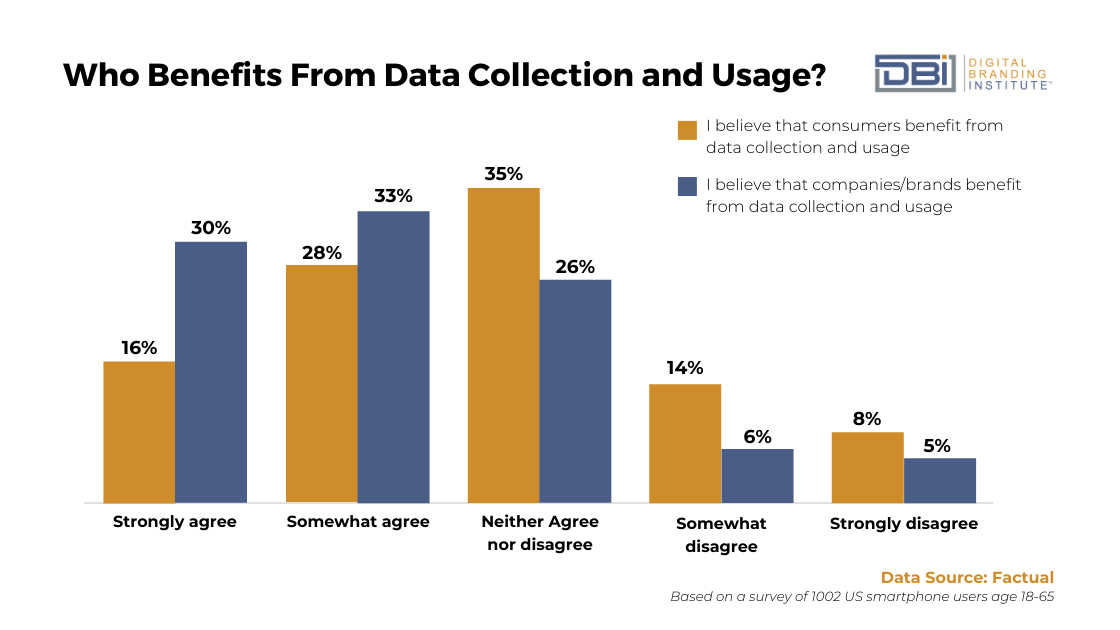Consumers know and understand that brands are collecting their data. However, they seem to think data collection benefits the brands more than it benefits them. They also have a complicated relationship with personalization. Let’s take a look.
On Privacy
A report by Factual has provided some interesting insight into customer concerns and opinions about data collection. When it comes to concerns about privacy and data collection, younger people are far less concerned about data privacy than older consumers.
This could be because they grew up surrounded by technology. So, they are less suspicious of such tactics in general.
Consumer Concerns
Factual surveyed over 1000 smartphone users aged 18-65. The vast majority of respondents were not openly against their data being collected. However, they do believe that this benefits brands more than it does them. Data collection also raises some common concerns. These include:
- Theft/fraud (72%)
- Stolen passwords (64%)
Something interesting has been explored in this research. People know that brands are collecting their data. However, there is possibly a gap in understanding when it comes to brand use. Over half of the respondents said that one of their concerns is not knowing what their data is being used for.
However, 59% of respondents do believe that their data is being used for personalization. Perhaps there are some misunderstandings when it comes to the specifics of it. The majority of respondents seem to think their data is being used for personalization. On the other hand, they also feel that they don’t know what their data is being used for.
Consumer Opinions On Data Collection And Usage

63% of the adults included in the survey say that they either strongly agree (30%) or somewhat agree (33%) that companies and brands benefit from using and collecting their data. A small minority, only 11%, disagree. They feel that brands do not benefit from data collection.
However, when asked if they felt consumers benefit from data collection, fewer had favorable opinions. Less than half of respondents (only 44%) felt that it is true that consumers benefit from data collection. And 22% felt there is no benefit for consumers at all.
Personalization and Data Sharing
Over half (52%) of respondents say they are willing to share data with companies if companies are more transparent. Consumers want to know the link between the data they are sharing and the benefits of sharing it.
In short, consumers don’t want to blindly hand over their data. They want to understand why they are sharing it. They also want to know where it is going and how sharing it will benefit them.
Consumers Want Transparency
This echoes the conclusions of research done last year by Vision Critical. Their survey was conducted amongst about 1000 American and Canadian adults. They had made an online purchase in the last year.
Their study found that the majority of adult online shoppers, nearly two-thirds, are more comfortable sharing their data under certain conditions. These include brands explaining what they will do with the data they collect.
The vast majority (86%) of those surveyed know that some amount of personal information about them is shared and stored whenever they take online actions. However, they do not love that. If given a choice, people are less willing to share info with brands. This is even if they know and trust them.
Do Consumers Want The Impossible?

There is a lot for digital branders and marketers to juggle.
Research shows that customers are quite protective of their data. In fact, a small minority never want to share it at all. However, a majority (58%) also want more targeted and specific messages. They want the benefits of personalized content.
On the other hand, a recent study by the Advertising Research Foundation found something interesting. Some consumers are not willing to part with certain data under any circumstances. Others even respond negatively to offers of personalization. In fact, it makes them even less likely to want to share any data at all.
Personalization seems very polarizing. Some just hate it. Factual found that other consumers say it improves their experience. They say that it helps them find products they like (53%). It also makes them feel like advertisers care about their needs (36%).
How Can Marketers Address This?
This is something that marketers struggle with. After all, data collection is required for personalization. This can improve the consumer experience. However, it can also make consumers feel like brands are stalking them.
This is a critical balance to strike. 63% of consumers say they have stopped making purchases from a brand due to personalization gone wrong. So, how your brand get it right?
Where is the line between helpful and creepy?
Understand Limits
80% of consumers are comfortable with brands using data they share directly. This is a solid majority. However, only 19% are comfortable with brands using the information they have inferred from other data that they have collected.
This actually makes a lot of sense. Think about it. You tell your neighbor when your birthday is. They remember and wish you a happy birthday. That is a nice gesture that would make you feel warmly towards them.
However, imagine they looked in through your window, saw your birthday marked on your wall calendar, and wished you a happy birthday based on that. How would you feel? On top of that, imagine you found out how they sourced that information later. That would likely make you feel uncomfortable.
Remember, behind all digital interactions are real people.
SEE ALSO: How Are Marketers Using Data to Personalize Experiences?
What Motivates Consumers To Share Information?

Transparency and respecting consumer limits are key. However, research from Episerver shows that something else motivates consumers to share information more. Their survey included more than 4000 shoppers in America and Europe. Two-thirds of the surveyed adults agree. Sharing personal information with a company in exchange for offers, product recommendations, and personalized discounts is worth it.
In this case, it makes it pretty difficult to argue that customers do not benefit from data collection at all. However, there are even limits to this.
Location, Location, Location
Another study from Factual found that 84% of mobile marketers are using location data. In addition, even more are planning to do so in the future. On paper, this looks like a smart strategy. However, the actual people being marketed to must be accounted for aswell. And data suggests that many people do not want to share their location data for marketing purposes.
Factual reported that almost three-quarters of respondents do not feel comfortable sharing their location data for marketing purposes. In the past 12 months, nearly half of the respondents took steps to boost their location privacy. People don’t want brands to know where they are.
They adjusted settings on their mobile phones and social media. People have actually changed their phone and social media settings to hide from advertising. Think about that.
People have become so annoyed that they have found ways to opt-out. If enough people do this, marketers can lose important channels. It makes it harder to reach consumers. In this case, marketers lose big.
Final Thoughts
Ultimately, some consumers will just never want to share their data for any reason. Some don’t care at all. However, they are not the majority. Most consumers accept a level of data collection. This is as long as they understand what their data is being used for. They also want to see genuine benefits from it.
Also, consumers do not want to feel stalked by brands. Likely, poor use of personalization has soured public opinion. Also, there are some issues of transparency. People tend to be suspicious of what they do not understand, after all.
There is a lot for marketers to digest. Getting things just right is a challenge.
How do you think marketers can use these tools to strike the right balance? Comment below…











